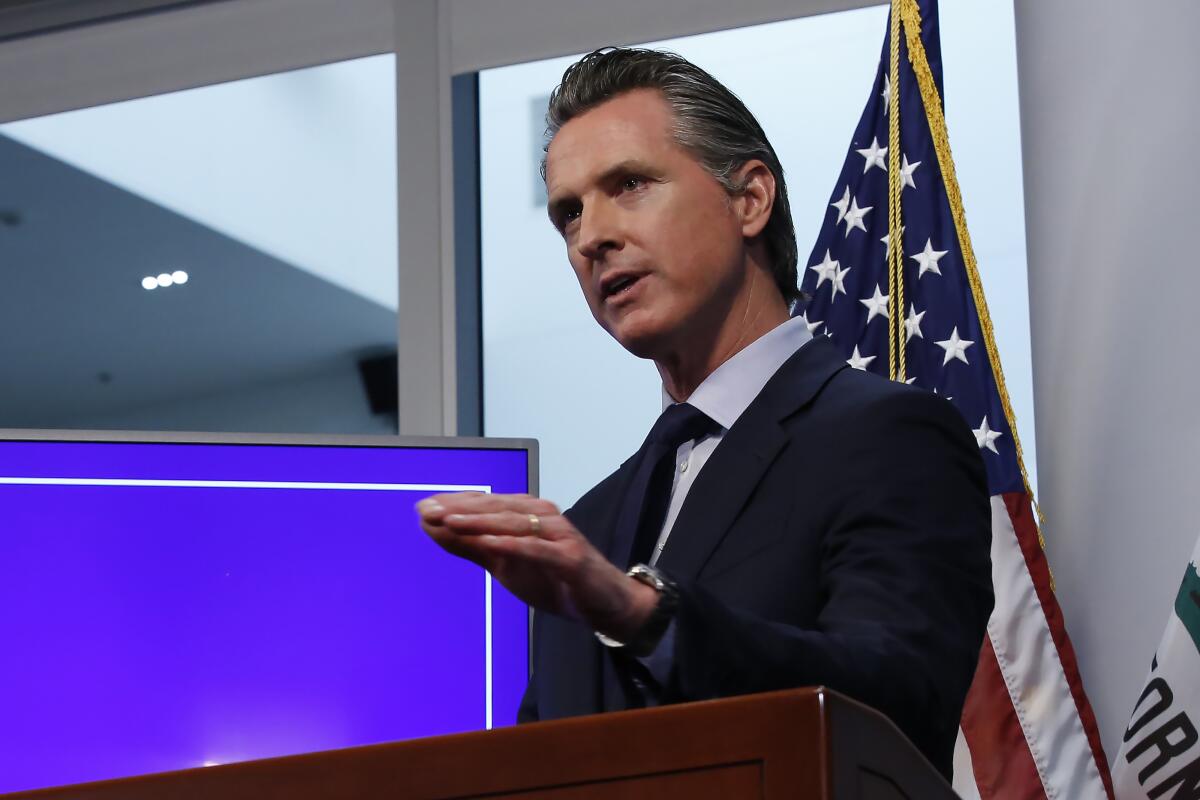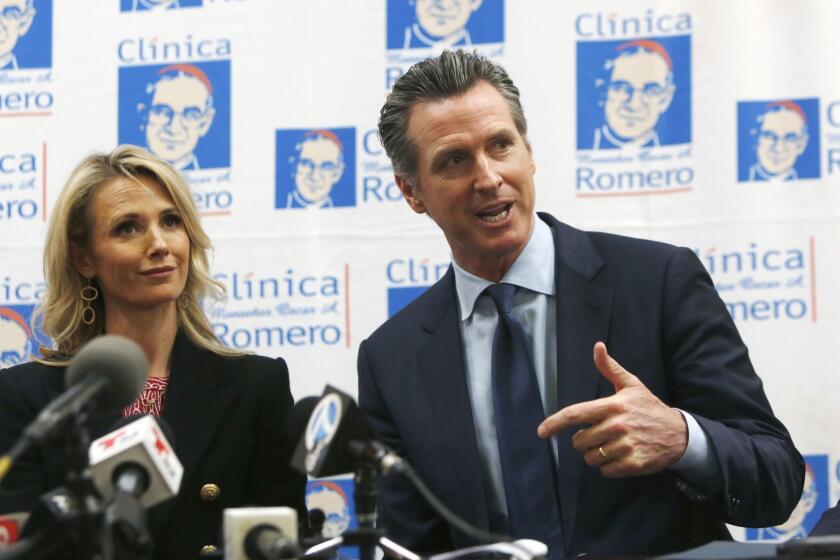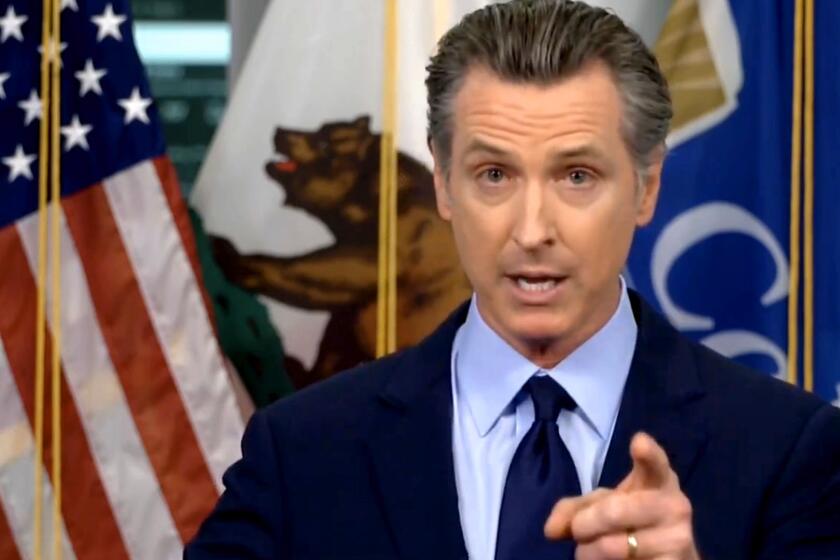Newsom’s friendship with lobbyist who threw French Laundry party brings questions

- Share via
SACRAMENTO — On the website of one of Sacramento’s most influential lobbying firms, partner Jason Kinney boasted of his close connection to Gavin Newsom, noting he has advised the governor for “nearly 14 years.”
The plug suddenly disappeared last month, days after Newsom drew national criticism for attending Kinney’s 50th birthday dinner at the famed Napa Valley restaurant the French Laundry.
The event turned into a political disaster for Newsom, drawing charges of hypocrisy at the very time the governor urged residents to avoid gatherings and stay home as much as possible amid an unprecedented surge in the coronavirus.
But the episode also exposed something that has long been the subject of quiet discussion in Sacramento: Newsom’s decision to maintain a tight relationship with Kinney, who is director of a lobbying firm with business before the governor.
Kinney is well known around the state Capitol as a strategist, ghostwriter of Newsom’s speeches and unofficial fixer summoned to help loosen the governor from political jams. His dual roles as an advisor to Newsom and a lobbyist paid by companies to influence the governor and his staff have raised questions about potential conflicts of interest for the administration.
“I think it certainly can cause the public to question whether any advice the governor is getting is in the public interest or in the interest of the companies that have paid Kinney’s firm to lobby,” said Emily Rusch, executive director of the California Public Interest Research Group, an independent consumer advocacy organization. “It’s common sense to question that.”
Newsom and his wife attended a birthday party for his political advisor Jason Kinney at the French Laundry in Yountville on Nov. 6.
Kinney’s firm, Axiom Advisors, has lobbied on behalf of several companies seeking to sway decision-making in Newsom’s office, including Netflix and unsecured creditors of Pacific Gas & Electric, records reviewed by The Times show. According to the firm, Kinney has built a firewall between his work for Newsom and Axiom’s clients, makes money only on work for his individual clients and does not profit from the firm’s overall earnings.
California law doesn’t expressly prohibit lobbying the administration while also advising the governor, and some of Newsom’s predecessors sought the input of Sacramento lobbyists.
Yet Kinney’s personal and professional alliance with Newsom has given him and his firm a unique position of power. In its list of the top players in state government and politics, Capitol Weekly described Kinney as “a sort of majordomo” for the governor who “makes strategic policy and political recommendations.” Axiom Advisors was launched shortly after Newsom’s election and has become one of the state’s top-grossing lobbying businesses.
The relationship, many in Sacramento say, was bound to draw attention to the ethical boundaries in the Newsom administration.
The Times spoke with more than two dozen lobbyists, Capitol staff members, legislators and political consultants about the governor’s work with Kinney. Many of them spoke on condition of anonymity, citing concerns that discussing Newsom and his advisor could affect their working relationships with both men.
Newsom and his office declined to answer any questions for this story.
“The Governor has been successful throughout a twenty year career in public service because he makes decisions in the interest of the public good,” said Sahar Robertson, a spokeswoman for Newsom, in a statement. “His decisions are rooted in good public policy, and he’s never hesitated to say no to organizations and individuals he has long relationships with when their priorities run counter to the public good.”
Molly Weedn, a spokeswoman for Kinney, said he separates his role as “an outside communications advisor on political issues” from his lobbying work.
“He adheres to strict ethical standards and fully and transparently discloses all lobbying activity,” Weedn said. “He does not use his role as an advisor to benefit the firm’s clients.”
Axiom reported receiving $582,266 from clients in the first three months of Newsom’s term — a figure that ballooned to $2.3 million by the end of the second quarter. From Newsom’s inauguration in 2019 through the end of September 2020, Axiom reported a total of $10.9 million for lobbying work.
While apologizing during a news conference last month for attending the French Laundry dinner, Newsom described Kinney as a friend he’s known nearly two decades.
The relationship dates to Newsom’s time as a San Francisco supervisor. Kinney said he met Newsom in 2002 during a statewide homelessness conference while working as a senior communications advisor and chief speechwriter for former Democratic Gov. Gray Davis. He described Newsom as the one the “most capable, dedicated human beings I’ve ever met.”
Newsom “was literally one of the few elected leaders in the nation with the courage and compassion to talk honestly about California’s homelessness crisis, and he was putting smart, local solutions on the table to help people get off the streets,” Kinney said in a statement.
Kinney, who advertised himself as a senior strategist for Newsom, helped run the then-lieutenant governor’s 2016 campaign to legalize marijuana. For years, Kinney has worked behind the scenes to strengthen Newsom’s relationships with influential leaders and delegates within the California Democratic Party, for which he has consulted during much of the last decade.
But the French Laundry dinner has prompted Kinney to edit his list of clients.
Pictures appear to show the governor eating with lobbyists at the French Laundry in a room with a roof, three walls and an open wall with glass doors.
His firm said he ended his work with the state Democratic Party this month. The change came shortly before the governor’s office released a new ethics policy that prohibits anyone from working as a paid advisor to the party, the governor or his campaigns while also lobbying the administration.
The rule, which was introduced just weeks after the French Laundry dinner, applies to all of the consultants who were on the governor’s or the California Democratic Party’s payrolls when it was announced on Dec. 11, Newsom’s office said. Kinney had ended his work with the party before that date and was not included on a list the governor’s office released of paid consultants who would be affected by the policy.
Like many established political operators in Sacramento, Kinney offers some services and communications strategy advice to the governor for free — a show of goodwill and a form of investment in a candidate — but has previously accepted payment to work on Newsom’s initiatives, state filings show. The lobbying ban does not address Kinney’s unpaid work for Newsom.
Axiom’s roster of clients includes dialysis provider DaVita, Marathon Petroleum, Poseidon Water, Acadia Healthcare and several companies in the marijuana business.
Netflix executives hired Kinney’s firm this year to lobby for a change in state law that could have made the company eligible for a tax credit potentially worth millions of dollars, according to state filings.
Those familiar with the tax bill said it came from the governor’s office — with Kinney’s involvement — in the final hours of the legislative session. The proposal was introduced so late that it required a special rule waiver to be considered.
The proposal ultimately failed, but records show that the Silicon Valley streaming giant paid Axiom Advisors $52,500 for working on the change to the tax credit from July through September. Earlier filings show the firm received an additional $87,500 for working on “tax issues” for Netflix from April through June.
Kinney declined to say whether he discussed the tax credit proposal with Newsom or his staff. Newsom did not respond to a question about whether the language in the proposal came from his office and if he or anyone on his staff discussed it with Kinney.
Sources close to the governor say he and Kinney have long been cognizant of the potential for conflicts of interest stemming from their relationship and note that Newsom scrutinizes issues involving any of his political advisors. Newsom’s departing chief of staff, Ann O’Leary, also tried to establish boundaries and screen outside advisors for potential conflicts, according to the sources. After announcing the new lobbying policy this month, O’Leary asked the state’s political watchdog agency for ideas on practices to further limit undue influence.
During Newsom’s transition into the governor’s office in late 2018, Kinney‘s firm said he recommended candidates for jobs in the administration, an unpaid volunteer role that also has been deleted from his biography on the Axiom Advisors website. Kinney declined to answer a question about whether he has ever lobbied any of the people he recommended after they landed positions in the administration, or connected them to other members of his firm.
In the weeks before Newsom was sworn in, a spokesman for the governor said he adopted a rule that prevented those who worked on the transition from lobbying transition officials. Kinney already had deregistered as a lobbyist before working on the transition. But that ban, the governor’s staff said, was short-lived and ended when Newsom officially took office.
Three weeks after Newsom was inaugurated as California’s 40th governor — delivering a speech Kinney helped craft — Kinney registered as a lobbyist for his new firm, Axiom Advisors.
California laws allow lobbyists to advise the politicians they seek to influence. Government accountability advocates, including Rusch of CalPIRG, say that even if efforts were made to address lobbyists influencing the elected officials they advise, it would be difficult to establish effective legal boundaries on a tight friendship.
Kinney also has served as an advisor to Sacramento Mayor Darrell Steinberg and was a spokesman and communications strategist for the state Senate’s Democratic Caucus and president pro tem’s office.
Kevin de León, a former leader of the state Senate who recently was elected to the Los Angeles City Council, said Kinney’s work for him and his Democratic colleagues never conflicted with his lobbying clients.
“He never, in one single instance, lobbied me on behalf of any of his clients,” De León said. “He had the good sense to know you keep a separation of church and state.”
Kinney’s activities have drawn the attention of the state’s political watchdog agency in the past. The Fair Political Practices Commission fined Kinney in 2013 for failing to properly register as a lobbyist and file disclosures about his activities.
An examination of Axiom’s clients through filings with the secretary of state shows the firm has been hired by several companies seeking to influence the governor and his administration. Some of those clients received favorable outcomes on their bills or issues, while others fell flat.
While Newsom grappled with the bankruptcy of PG&E, the largest investor-owned utility in California, Axiom made $220,000 to lobby him and the Legislature on behalf of a court-appointed panel of the company’s creditors.
The firm wrote in court documents that it spent a significant amount of time meeting with lawmakers and the governor’s office to discuss a law that established a $21-billion fund for PG&E and Newsom’s approval of the company’s reorganization plan, both described as major milestones in the case. Its work included efforts to “understand the governor’s views regarding the plan.”
Weedn, Axiom’s spokeswoman, said Kinney “did not lobby on behalf of the unsecured creditors of PG&E and has not had conversations with any officials about those issues.”
The Official Committee of Unsecured Creditors of PG&E, which represented financial institutions, contractors and electrical workers, paid Axiom $20,000 a month to lobby on the bankruptcy case for nearly a year. Axiom was required to file court documents requesting that a judge approve the payments and detailed more than 500 hours of work. Kinney reported a small number of hours worked, which included meetings with the Axiom team about the case, and other lobbyists on his team performed the bulk of the firm’s work, court filings show. The firm said that Kinney’s work did not involve lobbying.
Meanwhile, California environmentalists and government watchdog groups have been sounding the alarm about Axiom’s ties to a major oil company with business before the Newsom administration: Aera Energy, a partnership of Shell Oil and ExxonMobil.
Since April, the California Geologic Energy Management Division, known as CalGEM, has issued more than 50 new hydraulic fracturing permits to Aera Energy and Chevron.
Aera paid Axiom $200,000 in lobbying fees in 2019 and 2020, records at the secretary of state’s office show. The Newsom administration and CalGEM were listed among the agencies that Aera lobbied.
“Newsom’s close personal relationship with Kinney raises serious concerns that corporations that pay big money to Axiom can obtain preferential treatment from the governor,” said Derek Seidman of the Public Accountability Initiative, a Buffalo, N.Y.-based nonprofit focused on government and corporate accountability.
The oil permits issued to Aera came after a 2019 announcement by Newsom that he would temporarily block new hydraulic fracturing permits until the projects could be reviewed by an independent panel of scientists at the Lawrence Livermore National Laboratory. State Oil and Gas Supervisor Uduak-Joe Ntuk said in August that the permits issued since April underwent that independent environmental review.
In October, Newsom called on the California Legislature to ban hydraulic fracturing, an action he said is not within his executive authority as governor — an opinion disputed by environmentalists.
Less than 10 days after Newsom made that announcement, CalGEM issued six new fracking permits to Aera Energy.
On behalf of Aera, Axiom also lobbied legislators on a bill that would have mandated health and safety buffer zones around oil and gas wells and refineries near schools, playgrounds, nursing homes and other sensitive residential areas. The legislation was strongly opposed by the oil industry and failed to pass in the state Senate.
Weedn said Kinney did not conduct any work or receive any personal compensation from Aera.
With the coronavirus surging, large regions of the state under stay-at-home orders and a budding recall effort to boot him from office, the governor’s French Laundry gaffe couldn’t come at a worse time, said Matt Rexroad, a former Yolo County supervisor and Republican political consultant.
“It’s one little problem snowballing and becoming a big deal,” Rexroad said. “Right now he’s under the microscope.”
Although Rexroad said Newsom’s decision to attend Kinney’s dinner raises questions about his leadership during the pandemic, he noted it’s not out of the ordinary for governors to have close friends who work as their political consultants and moonlight as lobbyists.
“It’s not a problem if the candidate and the consultant are both aware of the motives and it’s fully disclosed,” Rexroad said. “The governor is a politician. He’s going to hang out with political people, and Jason Kinney is a political person.”
More to Read
Sign up for Essential California
The most important California stories and recommendations in your inbox every morning.
You may occasionally receive promotional content from the Los Angeles Times.













